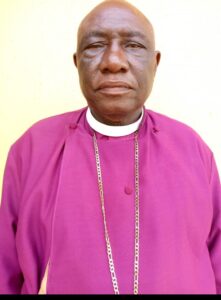

By Correspondent in Ilorin.

Bishop Israel Amoo.
The Bishop of the Church of Nigeria
(Anglican Communion) Diocese of New Bussa, the Most Rev. Israel Afolabi Amoo, has called on the political leaders to remember that the primary duty of every responsible government is to ensure security of lives and property.
The cleric made the call at the 5th Synod of the Church held at St John Church, New Bussa, Kwara State Province.
The Bishop, therefore, advised the Nigeria security forces to review their strategies and seek help from advanced nations to complement their efforts.
He stressed the need for the government at all levels to finance and give adequate priority to security of lives and property
According to him, if the situation in Nigeria were to be half of what it is today, violence, intolerance and fearful in 1914, the various nationalities that constitute Nigeria would have not have come together as done by Lord Lugard and his wife.
On census,he said:”Efforts in the past to have a credible national census were bedeviled by warped nations of what the census is all about. Thus fake and unrealistic figures were released.
“Our duty as a Diocese is to appeal to all ethnic groups, regions and religions to assist Nigeria to break the jinx of failed census exercise.
“We should not allow the competition between religions and tribes to deny us of social progress.”
On corruption, Bishop Amoo went memory lane,”Before the advent of the civilian regime of Chief Olusegun Obasanjo, this country had been fighting the monster called corruption. Every administration with a promise to fight this monster.
“While one will give kudos to Chief Olusegun Obasanjo who set up the institution,such as EFCC, ICPC, code of conduct Burean and code of conduct Tribunal to fight corruption, the regimes after him had so much at hand that sometimes we wonder whether they are truly fighting corruption or is the corruption that is fighting them.
“Many Nigerians have given up hope that something would ever be done again,as corruption is generally assumed to be of national proportion, connecting all power blocks at the national, state, local and Traditional levels.
The Bishop called on the Buhari-led government to vindicate the sit down – wait, if truly he is doing anything to fight corruption.
The cleric also urged the governnent to give bite to the execution of many of its programmes such as feeding of public primary school pupils,the cash support for Traders, arrest depreciating value of Naira,among others to make have direct bearing on the life of Nigerians.
“We were far more productive in 1970 – 1980 than we are today. In the 1970 – 1980, we were a net exporter of refined petroleum products. Today, we import all our refined petroleum products,”he added.
Nigerians were riding the locally assembled cars, buses and trucks. Peugeot cars in Kaduna and Volkswagen cars in Lagos. Leyland in Ibadan and ANAM Co in Enugu,produced buses and trucks. Steyr at Bauchi producing agricultural tractors.
“We were also producing almost all the components. Vono produced the seats in Lagos, Exile in Ibadan produced the batteries for the whole of West Africa.
“Isoglass and TSG in Ibadan producing the windshield. Ferodo in Ibadan produce the brake pads and disc.
“Tyres were produced by Dunlop in Lagos and Mitchelin in port – Harcourt. These types were produced from the rubber plantations located in Ogun, Cross River, Rivers State, Edo and Delta States.
“We were using refrigerators, freezers and Air – conditions, produced by Thermo cool and Debo. The cloths we were putting on were produced from UNTL Textile mills in Kaduna and Chellarams in Lagos.
“The pipes for our running water were produced by kwalipipe in Kano and Duraplast in Lagos. Our cooking was done through LPG gas stored inside gas cylinders,produced at the NGC factory, Ibadan.
“The Cables for the electrification were produced by the Nigeria wire and Cable, Ibadan, NOCACO in Kaduna and Kable metal in Lagos and Port – Harcourt.
“The Bata and Lennards produced our shoes. Not from imported leather but from locally tanned leather in Zaria, Kaduna and Kano.
“We were flying the Nigeria Airways to almost every country in the world. The Nigeria Airways was about the biggest in Africa at that time. Most of the food we ate were grown and produced in Nigeria,” he recalled.
Bishop Amoo decried the current situation where Nigerians import almost everything, saying that time has come to change the trend.
“Nigeria must move forward and regained her lost glory,”he stressed.
Edited by Dada Ahmed.

